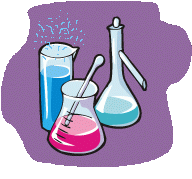


Description of experiment
Below follows a plain text transcript of the selected experiment.
![]()
Needed compounds:
-----------------
potassium dichromate : K2Cr2O7
potassium chromate : K2CrO4
thionyl chloride : OSCl2
Class:
------
elem=S,Cr
redox
Summary:
--------
Potassium dichromate is sparingly soluble in thionyl chloride, giving an
intensely colored red/orange/brown solution, which on addition to water
at once becomes green with a blue hue.
Potassium chromate does not dissolve in thionyl chloride. The solid changes
color from yellow to yellow/orange, and the solution becomes slightly colored,
but this faint reaction may be due to minor impurities in the potassium
chromate or thionyl chloride. If any potassium chromate dissolves, then it
is a very small amount.
Description:
------------
Sequence 1:
-----------
Take 1 ml of thionyl chloride and add a small amount of solid potassium
dichromate: The solid at once becomes dark red/brown. Also, some of the solid
dissolves and a deep red/brown solution is formed. Only small part of the
solid dissolves, and even then the color is very deep already.
Add a small amount of water to the liquid: A vigorous reaction occurs, most
of the red/brown material is converted to a green compound.
Add much more water: All thionyl chloride is decomposed quickly, and the
resulting solution is clear and green, with a bluish hue. This is the well-
known color of chromium(III), formed by reduction of dichromate in acidic
solution with sulfite. There also is a strong smell of sulphur dioxide.
Sequence 2:
-----------
Take 1 ml of thionyl chloride and add a small amount of solid potassium
chromate: The solid becomes orange. The liquid becomes very light yellow.
No visible amount of solid dissolves.
Add a lot of water: The thionyl chloride quickly is hydrolysed, formation of
HCl and SO2 (smell!!). The solution becomes deep green/blue, like in the
experiment with potassium dichromate.
![]()